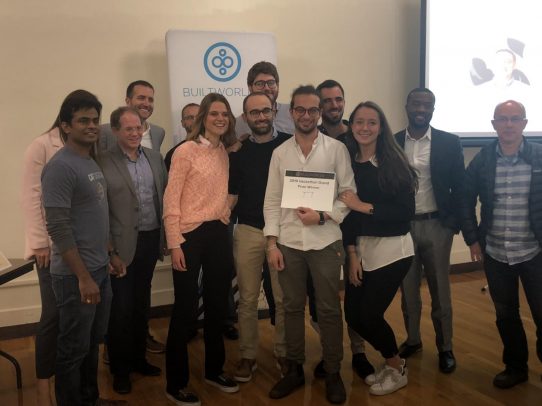UIC engineering team wins BuiltWorlds Hackathon
by Andrea Poet
A team of graduate students and alumni from the University of Illinois at Chicago’s College of Engineering won the 2019 BuiltWorlds Hackathon, taking home a $7,500 grand prize.
Four computer science students: Matteo Foglio, Guido Muscioni, Riccardo Pressiani (MS ‘19), and Francesco Sgherzi (MS ‘20) joined forces with two bioengineering students: Chiara Gambacorta, and Giulia Soresini (MS ‘20) for the competition. All are part of UIC’s Italy Program, which allows students from two top technical universities — Politecnico di Torino and Politecnico di Milano — to earn a master of science degree from UIC.
Hackathon participants worked for 36 hours over a weekend. They were tasked with choosing one of three projects to work on, including prototyping and developing new business ideas about cities, buildings, and infrastructure. The final projects were pitched to a panel of judges, including representatives from Clayco, Pepper Constructions, LitCon Group, Mechanical Inc., Autodesk, Caterpillar, and EllisDon Corporation.
“We never had the opportunity to participate in a hackathon focusing on this broad of a topic. It wasn’t a typical computer science hackathon, it was focused on construction, something we didn’t know anything about,” Sgherzi said. “You may have a similar type of hackathon in Italy, but it was the first time I saw a non-computer science problem tackled in a computer science way.”
The team chose the challenge presented by Clayco, which was focused on reducing the size of image libraries, and localizing pictures collected at construction sites. They proposed “Oculus,” a process to improve and streamline the process using Internet of Things (IoT) solutions.
“We designed a software algorithm that would map images and stitch them together, so we can reconstruct the room. The algorithm will eliminate duplicates and categorize each room,” Pressiani said. “We came up with a solution for a legacy problem and made improvements.”
The team members believe their previous experiences at similar hackathons and the skills they acquired while doing research at UIC and Politecnico di Milano played a key role in the development of their idea. In particular, they used their engineering experience to tackle a problem far from their comfort zone.
Key to the team’s success was Gambacorta’s and Soresini’s focus on making the business model work.
“We looked at components. The companies don’t want to spend so much money on the solutions. We changed our ideas many times,” said Gambacorta.
At the competition, the team was thrilled to learn of their win: three single task winners were announced before the grand prize winners.
“We thought for sure that one of the teams that won a single task won, and then they announced a fourth winner, the winner of the grand prize— us!” said Soresini.
While the Italy Program only requires one semester in the United States, all of the students remain in the Chicago area, and most have extended their study a second semester.
Foglio, Muscioni, and Pressiani were part of last year’s winning team at the Chicago Mobility Hackathon, and Foglio and Pressiani have since formed a startup, Wepo.io.
“Wepo is a software consulting company focused on artificial intelligence and machine learning. Our advisor, Tanya Berger Wolf, encouraged us to give it a shot,” Pressiani said. “We have a couple of clients and are talking with others.”
Categories

